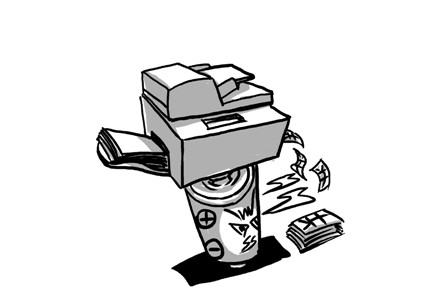 |
| Illustration: Lu Ting/GT |
Last week, Fudan University gave a preliminary response to accusations of academic misconduct levied at Wang Zhengmin by his former student and assistant, Wang Yucheng. A professor at the Eye and ENT Hospital of Fudan University, Wang Zhengmin is also a member of the Chinese Academy of Sciences (CAS), the highest honor for a Chinese academic.
The Academic Committee of Fudan University found that published papers that Wang co-authored essentially repeated the conclusions of previous papers. Fudan also acknowledged that in three of Wang's books, he reprinted many pictures without obtaining the original copyrights and used a large number of illustrations without indicating the sources.
Zhou Luwei, the director of Fudan's Academic Committee, said many of these academic violations happened long ago. But Zhou also said that Fudan would investigate any charges of academic misconduct, no matter how long ago they happened, as long as the informant provides sufficient evidence to support their claims.
In conducting the investigation, Fudan appears to have taken the incident seriously. However, measures to prevent similar misconduct from happening are still missing. Even today, Chinese college students receive so little training about academic standards that postgraduates have to look them up in academic journals themselves.
By contrast, undergrads in the West are given lectures on academic standards during orientation week. What is plagiarism? What kind of behavior counts as plagiarism? What will the consequences be if a student is caught cheating? All of these will be born into students' minds when they begin their studies.
However, Wang himself studied overseas, successfully obtaining his PhD in Switzerland, so the venerable academician can hardly feign ignorance. It seems he took it for granted that it would not be a problem to violate certain standards in China. In light of this, it's clear that Chinese academia needs to work harder to strengthen academic discipline and increase every scholar's introspection.
In fact, the reason Wang's case has triggered so much public attention is because it is a case of a student accusing his supervisor, an act that subverts traditional Chinese ethics dictating that a student should always respect and obey his teacher. Wang Yucheng's behavior is therefore regarded as a betrayal by some people.
It is not uncommon in Chinese universities for research students to call their supervisor "boss" instead of "teacher." While professors have the power to distribute research work and funding, students are cheap labor. The traditional teacher-student relationship has been undermined, and instead, it is "boss and lackey."
According to local media, when Wang Yucheng worked as Wang Zhengmin's assistant, he did a lot to help his "boss" become admitted to the prestigious CAS. However, once Wang Zhengmin had secured his membership, Wang Yucheng was spurned. This was reportedly the motive for Wang Yucheng to start examining his supervisor's work and look for evidence of academic misconduct.
Personal conflicts between professors and students are not uncommon. Many research assistants complain about their supervisors on the Internet: some say they receive no guidance from their mentors; others protest that professors exploit them, even going so far as to postpone a student's graduation date so they can continue to assist with research, but do not grant them the funding promised.
Most students vent their frustrations online then grin and bear it in reality. But Wang Yucheng made his revenge public, exposing the chaos in China's ivory tower. Wang's case is just the tip of the iceberg.
 Finland has more eggs in the Chinese basket than any other
Finland has more eggs in the Chinese basket than any other In pictures: PLA's digital equipment
In pictures: PLA's digital equipment  Protesters demonstrate during UN Climate Change Conference in Poland
Protesters demonstrate during UN Climate Change Conference in Poland  Self-made farmer billionaire donates 69 villas at hometown
Self-made farmer billionaire donates 69 villas at hometown Demolition of bizarre rooftop villa in Beijing still in progress
Demolition of bizarre rooftop villa in Beijing still in progress Service seminar for E China train attendants
Service seminar for E China train attendants  Supermodel-turned-designer
Supermodel-turned-designer Cheerleaders light up CBA regular season
Cheerleaders light up CBA regular season  Finland--anytime you want is right time to go: Ambassador
Finland--anytime you want is right time to go: Ambassador Maritime counter-terrorism drill
Maritime counter-terrorism drill College students want partner for sex needs
College students want partner for sex needs Models dazzle at Int'l Yacht Model Pageant
Models dazzle at Int'l Yacht Model Pageant  How to apply for a green card in China
How to apply for a green card in China National Geographic Traveler Photo Contest
National Geographic Traveler Photo Contest Weekly Sports Photos
Weekly Sports PhotosDay|Week|Month